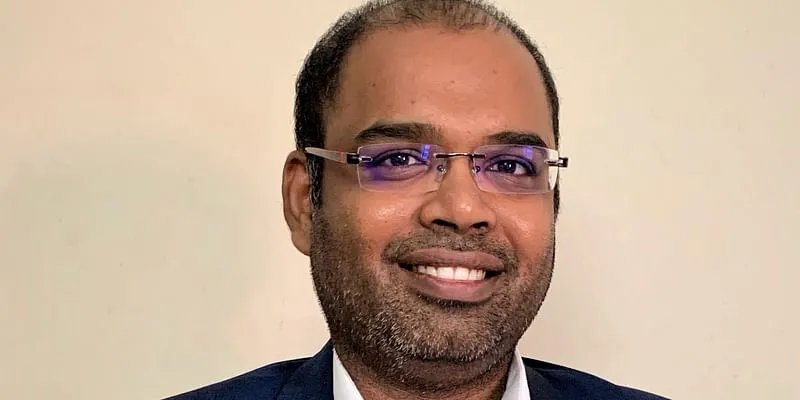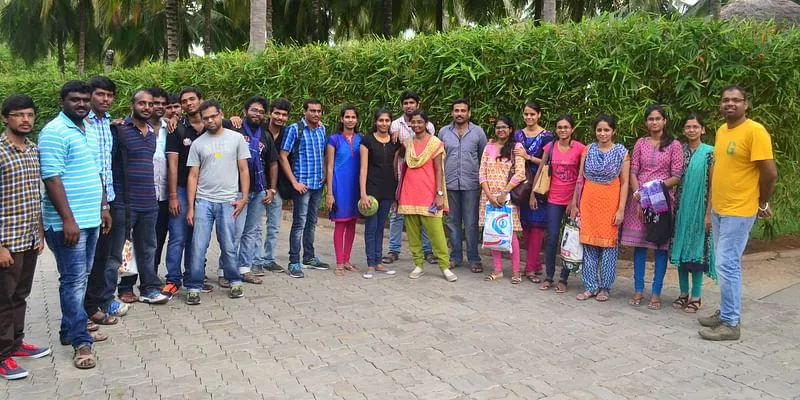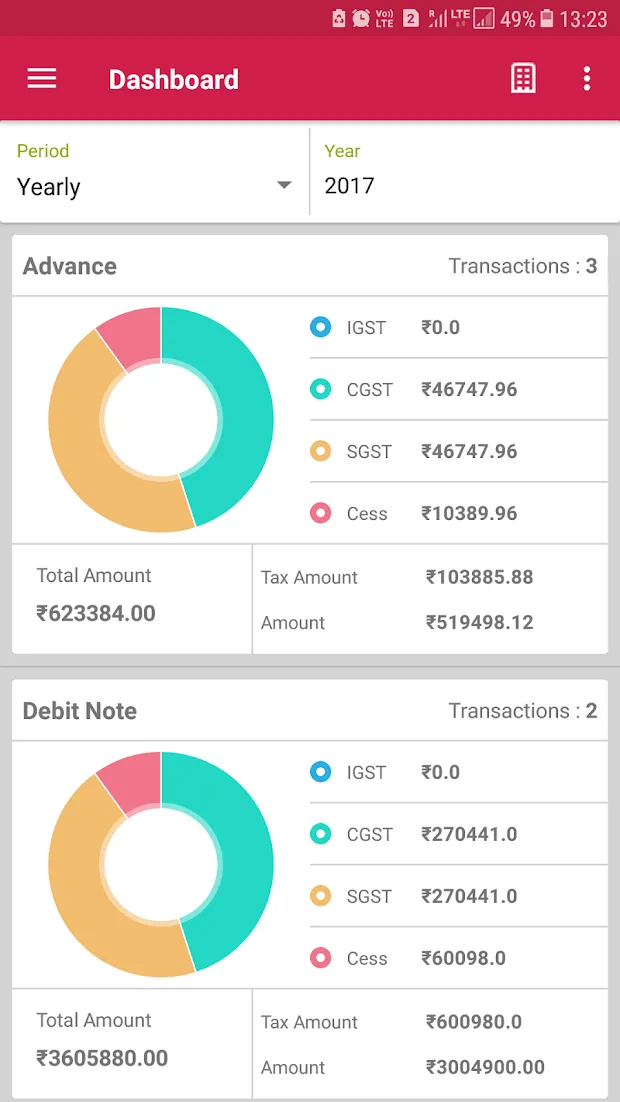Meet the man who built an end-to-end SaaS solution for MSMEs that now competes with the likes of Tally, QuickBooks, Zoho
Started in Coimbatore in 2012, SaaS solutions company Effitrac, today has over 30k users and 250 MSME clients. It competes with Tally, QuickBooks, and Zoho in the industry of digital adoption for MSMEs.
After the sudden demise of his father, Logesh Velusamy struggled to manage his family’s numerous businesses efficiently. The Coimbatore-based entrepreneur had quit his high-profile corporate career to run his family’s various businesses.
Working at leading IT solutions and business consultancy companies like IBS Software and Accenture had given the electronics engineer a flair for technology. However, he was simply unable to find the right technology tools to manage the various aspects of his family’s businesses.

Logesh Velusamy, founder and CEO, Effitrac
Logesh realised the market did not have a singular solution for managing cash flows, understanding revenue leakage, and accessing vital business data for his family’s MSMEs in electrical wholesale trading, poultry, feed manufacturing, textile retail, and other sectors.
“Without a skilled accountant, I could not identify cash flows between different legal entities. There was no existing solution that solved the various problems I was facing with managing several companies. But my background led me to believe such issues could be solved with technology, and it was indeed possible to build such a solution,” he tells SMBStory in an exclusive interview.
Logesh was not only familiar with the challenges MSMEs face but also understood the technology needed to solve them. This inspired him to build a platform that offered custom transactional services to MSMEs from various sectors.
Starting Effitrac
First, Logesh interviewed over 100 MSME owners to understand more about the challenges they faced in running their businesses. “Then, I partnered with solutions architect Gopinath Nallappan who felt the problem would be interesting to solve. In 2012, we started in Coimbatore. Till date, Gopinath, his brother Suresh, and I have invested $500,000 in the company,” he says.
Effitrac built an end-to-end business process management solution which is customisable and caters to over 14 MSME sectors such as food processing, textile manufacturing, general engineering, and more. Logesh engaged technology partners to customise and implement Effitrac’s solution to large enterprises as well.
Effitrac, which refers to itself as a SaaS company, began offering pre-configured packages linked to the size and complexity of the MSME client. These packages comprise solutions for digital bookkeeping, CRM, and ERP. The solutions address several business aspects, including but not limited to purchasing, production, marketing, invoicing, managing inventory, HR management, customer relations management, and accounting.
“Our cloud-based solution offers MSMEs real-time visibility into its operations, thereby driving predictability, profitability, and sustainability of its business. Our software also generates compliance and business intelligence reports to help business owners scale up,” Logesh explains.

The Effitrac team
The challenge of low awareness
According to Logesh, though his team had built a great product, he quickly found that awareness of technology tools among MSMEs was low. Few MSMEs believed in investing in technology tools to scale their business. Further, many MSMEs operated out of Tier 2 and Tier 3 cities, where skilled manpower for operating technology was scarce.
“We also saw most micro-businesses were family-run and did not employ accountants for bookkeeping. The MSMEs all had a resistance towards technology and were unsure of their ability to adopt the tools. Moreover, it was not easy getting time from business owners,” Logesh explains.
Despite this, Logesh pushed for interviews and meetings with potential customers, and this paid off. By understanding the unique pain points faced by MSMEs from different sectors, Effitrac was able to compile the rules for self-sign up on the software based on the nature of the MSME, its industry, and its skill sets, etc.
“We also had to educate MSMEs about the importance of technology tools and that investing in them will help them grow. This entire process of meetings and building awareness took a lot of time but it was important. Without this, our platform could not have taken off. We were able to include pre-compiled templates that made it easy for an MSME to sign up and use our solution,” Logesh explains.

Desktop view of Effitrac's SaaS product
User experience and pricing
Effitrac then engineered its SaaS product in such a way that it simplified the user experience, and also made it easily accessible through a mobile app. By making its software’s workflows intuitive and easy to understand, it minimised the need for training a person to use software to manage complex business processes.
Effitrac also presented its end users, i.e. business owners, the option to directly enter financial information without knowing if it fell under the credit or debit column.
“Our solution is a low OPEX and no CAPEX offering - it is cost-effective for MSMEs as they do not have to worry about installation times or technical knowledge. We have tailor-made packages starting at just Rs 156 per month, billed annually. Traditionally, MSMEs would either struggle to find a technology suited to their needs or would invest in an expensive enterprise solution,” he says.
Effitrac’s low cost and customer-first approach seems to have worked - it claims to have over 30,000 end customers, served 250 clients across India and the Middle East, and processed Rs 500 crore worth invoices. Logesh adds the company’s turnover in 2019-20 was Rs 1.2 crore.
The Coimbatore company may have found a niche in its custom business solutions, but it is playing in the same market as the likes of Tally, Intuit QuickBooks, , , and more. However, Logesh believes Effitrac is unique.
“Our competitor’s solutions require customers to onboard a partner to customise the solution to suit them, while ours has a zero-code customisation platform. Further, some enterprise solutions offered by the large brands are more suited for big enterprises. MSMEs find such solutions unwieldy and expensive. Some competitors also don’t offer an end-to-end business process solution like ours,” he says.

Mobile view of Effitrac's SaaS product
Market scenario and the way forward
Logesh admits the market is large and there is enough room for multiple players to vie for a piece of the pie. A 2019 Zinnov report had estimated the total digital opportunity offered by Indian MSMEs will grow from around $30 billion in 2019 to $85 billion in 2024.
Going forward, Effitrac aims to employ Machine Learning (ML) and Natural Language Processing (NLP) to automate bank payments and expense data entry for users of its software. It is also aligning its business strategy to acquire one million users in three years in the wake of the COVID-19 pandemic.
“Due to COVID-19, the spending power of MSMEs on IT has come down in the short term. So we introduced the MSME Cloud package starting from just Rs 156 per month. In the near and long term, we are seeing that the government’s focus on digitisation and Atmanirbhar Bharat has positively impacted MSMEs towards exploring technology solutions to boost their efficiencies. This will prompt them to invest in technology and it will be positive for us,” Logesh says.
Its plans for scaling up also include enabling native language experiences by integrating Tamil, Hindi, Telugu, Malayalam, Kannada, and other languages in its product.
Edited by Dipti D






